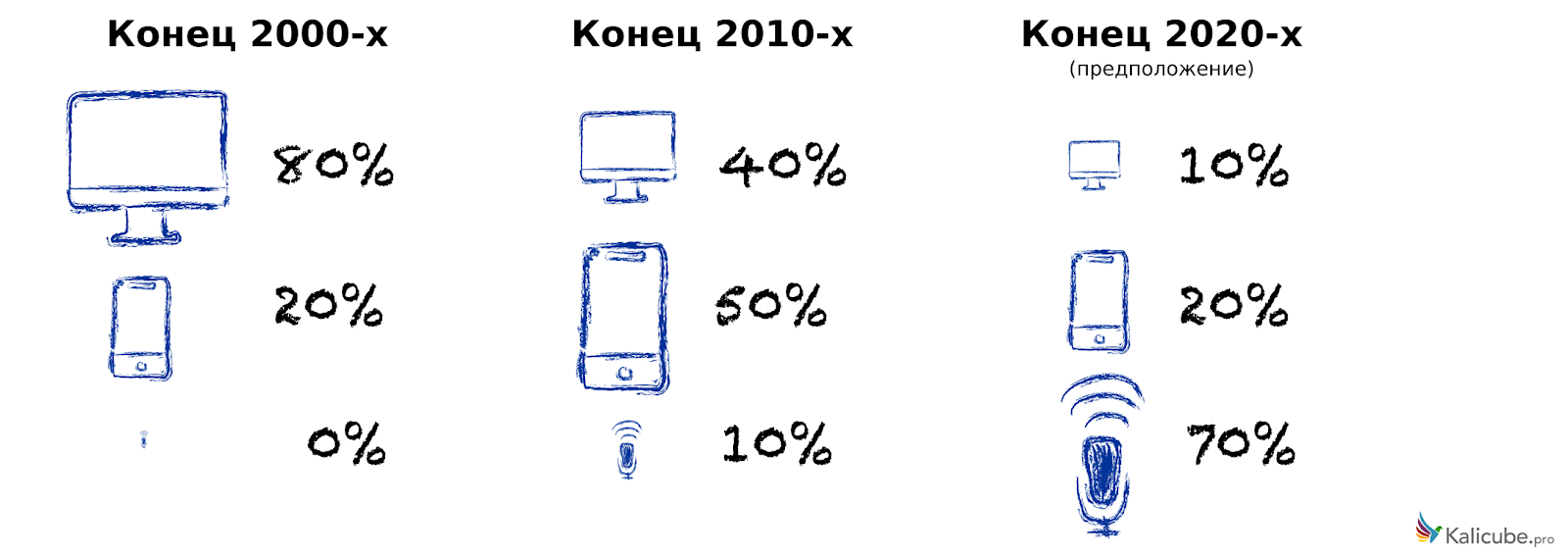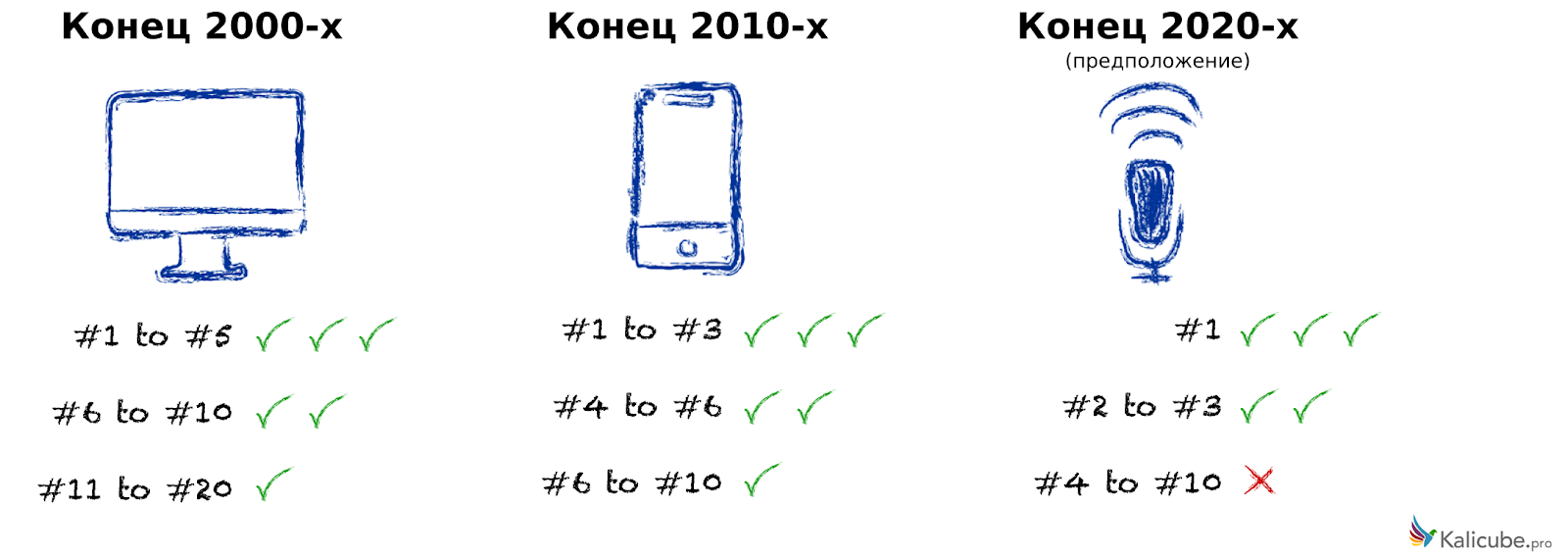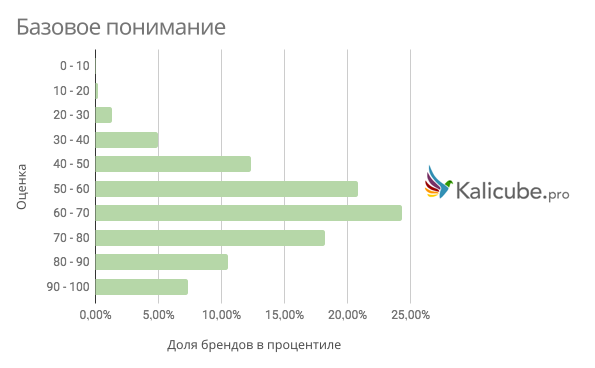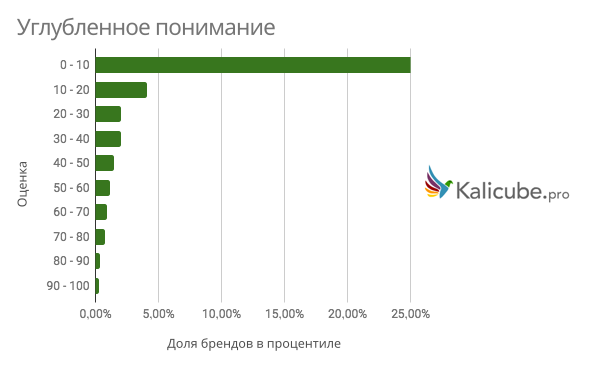The main criteria for SEO and AEO in the future - understanding and credibility

By sending a request to Google (or Bing), we formulate a problem that needs to be solved, or a question that needs to be found the right answer. The meaning of the existence of these search engines has always been to quickly and easily direct users to the best possible result .
With the increasing popularity of voice input, search engines are increasingly seeking to provide the one and only right solution and increasingly rely on criteria such as understanding and reliability.
')
What needs to be done to take advantage of this?
In this article we will look at:
- Overview of the current situation.
- Trends in the development of search engines.
- What you need to do today.
Transferred to Alconost
Overview of the current situation
Desktop PCs → mobile devices → voice input
Search develops with the devices used - and this is the most important thing. The transition of users from desktop PCs to mobile devices has significantly influenced (and continues to influence) the behavior of search engines. Using voice queries will have an even greater impact - on how users search, and on how search engines give answers.

Voice communication is more verbose, natural in nature ... and ultimately requires a single answer. What does this mean in the context of the relative importance of positions in search results?
In the 2000s, when desktops dominated, the position on the first page of issue was considered a success, the next few pages were an acceptable result.
Here the user chooses the best solution (answer) from 10–20 options.
In today's mobile world, success is the 3rd place in issuing. Acceptable results - the top half of the first page.
In this case, the user chooses the best solution (answer) from a half dozen options.
Google and Bing from systems for simple search are transformed into systems for receiving answers to questions asked in natural language (English “answer engines”, optimization for them - AEO). Therefore, success can be considered the first position (and more often - “position 0”), and an acceptable result - the third place.
In this situation, the user accepts the proposed best solution (answer), but can still choose one of two or three other options (with some effort).

Acceptable ranking in search results by device
What does this mean for natural traffic?
While it is 2018, it is still too early to worry. This year the situation will not change much. But this is just the right time to move from the principle “either the first page or nowhere” to the principle “either the first position or nowhere” and start preparing the site and company for a new paradigm.
But when the year 2020 comes, it’s time to worry.
It is unlikely that someone would call it unwise to assume that by 2022 the search traffic will be equally divided between desktop PCs, mobile devices and voice input.
- In 2005, the first place gave 30% market share.
- In 2017, the first place gave 40% of the market share.
- In 2022, the first place will give 60% market share.
- ...
- In 2026, the first place will give 80% of the market share.
As can be seen, the shift towards greater importance of the first position in issuance is accelerating.
We are gradually moving to the moment when making voice queries will be very convenient, so it will be decisive to be able to take the first position (No. 1, “position 0”, “recommended option”, “answer window”). Competitors are already aware of - and are working on it.
However, you shouldn't tear your hair out - not everything is so gloomy:
- The importance of the trend “No. 1 or Nowhere” will strongly depend on the market and type of business. In general, this will affect primarily niche markets and local business representatives.
- The number of verbose clarifying queries will increase, so getting into first place will be possible at least in some returns, thus dividing the risks.
- Voice search will not be able to completely replace mobile devices as they did not replace desktop PCs.
- It is very important to remember that desktops, mobile devices and voice input will still drive their share of traffic . What exactly will be the distribution, we can only guess.
Search Engine Development Trends

That is what Google needs in the first place.
Understanding. Google's search algorithms need to understand who you are and what you offer - then they will be able to consider your proposal as a potential candidate for the best solution.
Credibility Once it becomes clear who you are and what you are offering, your proposal can be chosen as the best of several options - for this, Google relies on such a thing as relative certainty.
In the new world of answer-searching systems, the most important thing is understanding and authenticity.
The rest is secondary.
What algorithms of Google can understand now?
Basic understanding
Google's algorithms do not start from scratch: they already understand something about a variety of brands - basic information. And for most brands, this is pretty good basic knowledge. Below are some numbers from the site Kalicube.pro (which measures the credibility of the brand).

Once in the top 20 percent, you can get a significant competitive advantage.
In-depth understanding
The Google algorithms lack details and confidence in the knowledge gained — what I call “in-depth understanding.” Today, Google has this level of understanding for very few brands - perhaps five percent or even less! Here are the most tempting opportunities: Google gives a significant advantage to those brands in respect of which there is confidence in the correctness and sufficient details of knowledge.

Note. The first line goes far beyond the schedule and reaches almost 80%. This means that Google’s algorithms do not have an in-depth understanding of more than 80% of brands.
Reliability from the point of view of Google
As already mentioned, the search algorithms do not start from scratch: they already have an “opinion” about the reliability of specific brands (good or bad). The validity of this opinion is supported by a large amount of information.

Once in the top 20 percent, you can get a significant competitive advantage.
What you need to do today

What to do to get ahead of competitors.
Informing. You can relax and hope that the algorithms themselves "understand" your brand and your suggestions. And you can actively "communicate" with them, giving information about who you are and what you offer.
Conviction. You can relax and hope that the algorithms themselves determine that you and your proposal are the best of the best. And you can try to convince them that your offer is the best and deserves more confidence than the others.
Let's look at it from the other side: now all responsibility is on you.
Inform - that the search engine algorithms understand you and are convinced that your brand is the most reliable solution.

Methods to help effectively inform search algorithms and expand their brand knowledge
Council Type in the search for the name of your brand and see what appears on pages 1 and 2: you need to work to ensure that all the results on the first pages reflect a positive, consistent and unambiguous idea of who you are and what you do.
- Semantic HTML5.
- Structured markup scheme.
- Quality materials using the appropriate dictionary.
- Provide links and references on the pages of the most suitable brands and increase their quality.
- Receive confirmation from third parties (not related to you) and increase the level of confirmation.
- Confirm and increase the value of external references and links on the brand's website.

Methods to help you convince Google that you are trustworthy
Council Look for the name of your brand by adding the word “reviews”, and see what appears on pages 1, 2 and 3 - this is what Google considers the most representative public opinion about your brand. Your first priority is to work to ensure that the results on the first two pages represent your brand only on the positive side.
- Promote positive results from pages 2 and 3, replacing them with negative ones (no need to spam with fake reviews - this will turn against you).
- Positive reviews on relevant platforms that appear on pages 1 and 2.
- Ask journalists to update the articles that appear on the first two pages.
- Positive reviews and customer reviews in social networks (including your reaction to them).
- Confirmation of colleagues in the industry (associations, conferences, etc.).
- Enlist good support from opinion leaders and journalists.
- Provide links and references on the pages of the most appropriate brands.
- Confirm and increase the value of all listed on your own site.
A margin note. Understanding and credibility must be developed simultaneously.
To give credibility to the brand and its offers, Google needs to understand who you are.
Reliability without understanding means nothing. If you understand, but do not trust you (bad reviews, negative opinions on social networks, etc.) - this is understandably bad. Understanding without trust can destroy a brand.
Cheat Sheet for the Future by Answer Systems

- Google's algorithms need to be understood, and your task is to inform and train them.
- Google's algorithms are looking for reliable information, and your task is to convince them that you can be trusted.
Understanding and authenticity together ensure brand credibility
Note. The article was written based on the results of an extensive research that I conducted since January 2017 for the Kalicube.pro site. In addition, to illustrate the current level of understanding that the Google algorithms have, and how they take into account the reliability, some figures from the data from Kalicube.pro were used. Below is how much information we collected and analyzed last year.

About the translator
The article is translated in Alconost.
Alconost is engaged in the localization of games , applications and sites in 68 languages. Language translators, linguistic testing, cloud platform with API, continuous localization, 24/7 project managers, any formats of string resources.
We also do multilingual contextual advertising and promotion of multilingual sites .
Read more
Source: https://habr.com/ru/post/352328/
All Articles